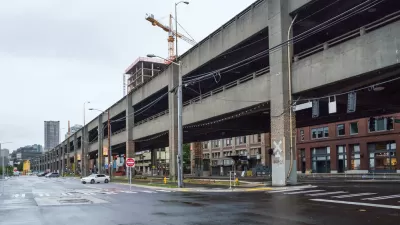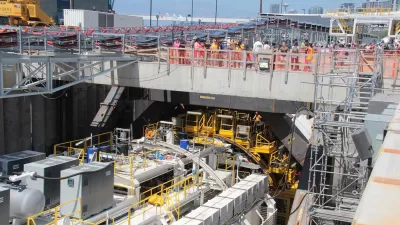With the Bertha tunneling-boring machine stuck in the mud under Seattle for more than a year, officials turned to a politician known for his ability to stop transportation in its tracks.
A surprising development in the behind-the-scenes saga of the massive tunnel-boring machine known as Bertha: anonymous sources inside the Washington State Department of Transportation have revealed that the agency briefly retained the services of New Jersey Governor Chris Christie to help jumpstart the stalled Alaskan Way Viaduct project in Seattle.
That is to say, Gov. Christie was brought on to try some old-fashioned reverse psychology. But don't call him a "tunnel-boring machine whisperer" just yet—sources say the technique didn't work.
"We thought, who better to make a convincing case to Bertha of its abject failure and inherent wastefulness than the same person who killed the most critical tunneling project in the country?" according to a state transportation official speaking on condition of anonymity, referring to Gov. Christie's infamous 2012 decision to kill the Trans-Hudson Passenger Rail Tunnel.
Sources close to the project say Gov. Christie communicated verbally with Bertha, describing the tunnel boring machine and all of its kind as poorly-conceived wastes of taxpayer money. There is no email or written record of Gov. Christie's involvement in the project, however.
Although reverse psychology failed, state transportation officials say the experiment showed that all options were on the table in trying to get Bertha moving again. "Duct tape" and/or "dumb luck" are currently given credit for Bertha's recent re-emergence from its subterranean meltdown.
FULL STORY: Chris Christie Hired to Try Reverse Psychology on Bertha Tunneling Project

Planetizen Federal Action Tracker
A weekly monitor of how Trump’s orders and actions are impacting planners and planning in America.

Chicago’s Ghost Rails
Just beneath the surface of the modern city lie the remnants of its expansive early 20th-century streetcar system.

San Antonio and Austin are Fusing Into one Massive Megaregion
The region spanning the two central Texas cities is growing fast, posing challenges for local infrastructure and water supplies.

Since Zion's Shuttles Went Electric “The Smog is Gone”
Visitors to Zion National Park can enjoy the canyon via the nation’s first fully electric park shuttle system.

Trump Distributing DOT Safety Funds at 1/10 Rate of Biden
Funds for Safe Streets and other transportation safety and equity programs are being held up by administrative reviews and conflicts with the Trump administration’s priorities.

German Cities Subsidize Taxis for Women Amid Wave of Violence
Free or low-cost taxi rides can help women navigate cities more safely, but critics say the programs don't address the root causes of violence against women.
Urban Design for Planners 1: Software Tools
This six-course series explores essential urban design concepts using open source software and equips planners with the tools they need to participate fully in the urban design process.
Planning for Universal Design
Learn the tools for implementing Universal Design in planning regulations.
planning NEXT
Appalachian Highlands Housing Partners
Mpact (founded as Rail~Volution)
City of Camden Redevelopment Agency
City of Astoria
City of Portland
City of Laramie




























